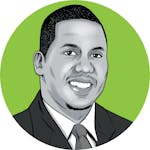When I first walked into Carl Johnson's community center last week, I called him "Pastor Carl Johnson." He stopped me as he shook my hand.
"I'm just 'Carl,'" said Johnson, the leader of St. Paul's Faith City Church and executive director of the G.W. Carver Cultural Center for Innovation. "I'm not your pastor."
For the past five years, Johnson has led a church on E. 7th Street that has become a community beacon with a hot meals program, a coffee shop, a job skills initiative and a grocery store. I'm a former church kid who spent most of the weekends of my youth in various pews in Milwaukee, but I had never seen a church like Johnson's.
When he first moved to Minnesota from Lima, Ohio, in 2016 with his wife and three daughters, he noticed the neighborhood they'd selected to plant a church had multiple challenges, including a lack of food resources.
According to USA.com, Faith City Church is in a ZIP code that's ranked 725th out of 873 in Minnesota based on median income. While his ultimate mission was spiritual, Johnson has never viewed his calling with a narrow lens.
"The fact is 80 percent of our church are people who live in this neighborhood," Johnson said. "You don't have a lot of people driving in so when people come into our church, they're looking for something very specific from us. They're looking for a community-oriented church. We wanted to be normal, that the church is embedded in the community again, that is part of our pillar. And that's where this idea came from. 'How can we continue to be a pillar within our community?'"
I picked Johnson as the first profile subject for my "More than a Face" series of columns, which will highlight our local heroes. When I reached out to some of my contacts in the Twin Cities who work with marginalized groups, they pointed me toward Johnson, and I understand why.
His parents divorced when he was 3 years old, so he moved between New Jersey and Atlanta throughout his childhood. As an adult, he decided to travel and see the world.
That ambition and curiosity took him to places like South Carolina, North Carolina, Florida and New York before he landed in Lima, where John Dillinger once broke out of jail in one of his most infamous escapes.
"John Dillinger robbed a bank there, so there used to be a saying that 'You never rob a bank in Lima, Ohio, because you'll get caught by the train,' because they had this train that takes an hour and a half, and you'll get stuck the whole time. There is no way around it."
Johnson has long sought to understand the voices on both sides of the tracks in his communities.
And through his travels, he discovered that he wanted to pastor a church that had a genuine relationship to its community. That's how Storehouse Grocers and Storehouse Coffee were birthed. At the for-profit grocery store, residents of this diverse community buy jasmine rice, beans and other products but nothing costs more than $8.
Johnson said the store helps address the area's food insecurity challenges and funds a hot meals program. The coffee shop, he said, is a place to gather and "feel safe."
And he also has a fellowship program that helps people ages 18-30 learn the skills to work in the food industry and then get jobs with some of the organizations, businesses and restaurants that have partnered with the cultural center Johnson also operates through the church.
He said the word "church" today is sometimes off-putting for people, but his church's outlets encourage a sense of community he's embraced. Feeding and supporting those in his neighborhood, he said, is a priority.
"I love this motif of the table," he said. "It's everywhere, like it doesn't matter, if you're in Africa, if you're in Europe, if you're in Tahiti. The church has a table. And in Africa, there is this thing that they do in West Africa, where if there are problems, they take the warring tribes and make them eat a meal with each other and they call it the table of reconciliation. And I had a thought. What if that was part of our church, that we get people to sit down at tables and be real with each other again? You cry, you laugh. We're our own personal family."
I believe the Twin Cities — and beyond — is filled with folks like Johnson who may sometimes feel hidden. But they have stories that should be told. And that's why we're starting "More than a Face," a new occasional series that will shine a spotlight on the remarkable and diverse folks throughout our homes, communities, businesses and neighborhoods. The people who the media may not typically encounter but still deserve to be recognized. I'd like to tell their stories but I need your help. Send me their names. Invite me to the spaces where they thrive.
I only have one goal: I'd like to help us all meet some of our neighbors.
Medcalf: Join us for a conversation with Minnesota author Junauda Petrus
Medcalf: Amid challenging economic times, a reminder about what's really valuable
Medcalf: A community pillar in north Minneapolis celebrates 100 years
![Basketball courts at the new Lifetime Fitness at Southdale Center in Edina, Minn., on Monday, December 2, 2019. ] RENEE JONES SCHNEIDER ¥ renee.j](https://arc.stimg.co/startribunemedia/6RAMR36J56VI6UXLMJJHL4FJIU.jpg?h=91&w=145&fit=crop&bg=999&crop=faces)
Medcalf: Life Time's plans to close Minneapolis, Edina courts deserve pushback


